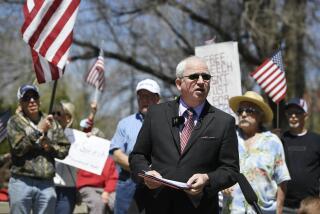UPDATE : Unemployed Rostenkowski Is Facing a Huge Dilemma : The once-powerful lawmaker must find a way to handle soaring legal bills or take the unpleasant quick fix: a plea bargain.
- Share via
WASHINGTON — How the mighty do fall.
Once one of America’s most powerful legislators, Dan Rostenkowski now is a private citizen facing a huge legal and financial dilemma over allegations about his conduct in the House of Representatives. He must either find a way to deal with legal bills that continue to skyrocket, or find a quick way to stanch his financial hemorrhaging: namely, a plea bargain.
The latter arrangement would end his protracted defense against political corruption charges, but it probably would involve serving at least a limited prison term.
In his 36 years of congressional service, the burly Chicago Democrat rose to become chairman of the House’s most powerful panel, the Ways and Means Committee, through which all tax legislation passes. He was constantly feted by trade associations, special interest groups and lobbyists for the nation’s largest corporations--dining at fancy restaurants in Georgetown and taking free golfing junkets to West Palm Beach, Fla., or the Caribbean in the winter.
After 13 years as committee chairman, he was forced to give up that post under House rules when he was indicted last May 31 on 17 counts of corruption. A federal grand jury charged that he misappropriated more than $640,000 in government funds in a series of schemes, including the hiring of “ghost employees” who gave him kickbacks, conversion of House post office funds to his personal use and the expenditure of official funds on gifts for friends and relatives.
Rostenkowski vehemently denied the charges after rejecting a plea agreement that his previous lawyer, Robert S. Bennett, spent months trying to negotiate for him.
But now, the out-of-work Rosty, who was defeated for reelection in November, may be forced to reconsider.
“If he pleads guilty to something . . . he knows he’d have to resign from the boards of some companies he’s on, and it would kill his hopes of getting consulting work,” a source close to Rostenkowski said.
“On the other hand, any former official in his situation realizes that when as many as 17 charges have been heaped upon you, it’s likely that a jury is going to convict you of something.”
A federal law enforcement official close to the case added: “Rostenkowski may just be psychologically unable to plead guilty. Maybe he cannot fathom the idea he may go to jail.”
In a recent tape-recorded interview with a hometown paper, the Chicago Sun-Times, the 67-year-old Rostenkowski was asked if he would ever accept a negotiated plea agreement.
“That is total speculation,” he replied.
“Does that mean no?” the reporter asked.
“I’ve got lawyers to make that decision,” Rostenkowski demurred, choosing to leave the question open.
In the same interview, he said he would like to obtain work as a corporate consultant to make up the difference between his congressional pension of $96,000 and his former government salary of $133,600. He has outstanding legal bills of $300,000 to $400,000, he said, adding: “I don’t think I have enough to cover it.”
Rostenkowski declined to speak directly to The Times. But Dan K. Webb, his attorney, insisted there are no plans for any plea bargain.
“He has made it very clear to me that he’s not interested in any plea discussions,” said Webb, a former U.S. attorney in Chicago.
Starting as far back as 1992, when U.S. prosecutors began zeroing in on him, Rostenkowski has used more than $2 million of his political campaign donations to help cover legal bills from 10 separate law firms for himself and some associates, official filings show.
His legal bills have mounted largely because Rostenkowski’s lawyers have raised a novel defense to the corruption charges, one that has involved court hearings over a period of many months. They have challenged the indictment on grounds that Congress, and not the executive branch, has the right to determine the conduct of its members.
Although U.S. District Judge Norma Holloway Johnson has ruled against them, defense attorneys are appealing the issue--a process that will not be completed until late this year.
Seeking his 19th term in office last year, Rostenkowski was shocked at the defeat handed him by a political unknown, Republican Michael Patrick Flanagan. So confident was the veteran congressman of victory that he spent only $78,000 in the race, keeping $353,824 in his campaign fund to use for legal bills, according to official reports on file.
A legal defense fund he started while in Congress features a list of group and individual contributors that provides a vivid reminder of his former power.
The latest filings on Capitol Hill, for example, list lobbies that donated the maximum $5,000 each. They include the Tobacco Institute, the American Trucking Assn., the Wine & Spirits Wholesalers and the Distilled Spirits Council.
Corporations that contributed $5,000 each were Anheuser-Busch’s political action committee, CNA Financial Corp., E. & J. Gallo Winery, Federal Express, Heublein, Metropolitan Life Insurance Co., Montgomery Ward, Pepsi Cola General Bottlers, Philip Morris Inc. and others.
Times staff writer Dwight Morris contributed to this story.
More to Read
Sign up for Essential California
The most important California stories and recommendations in your inbox every morning.
You may occasionally receive promotional content from the Los Angeles Times.













